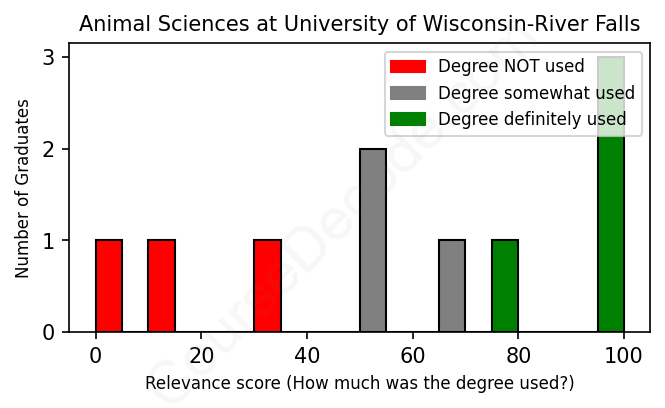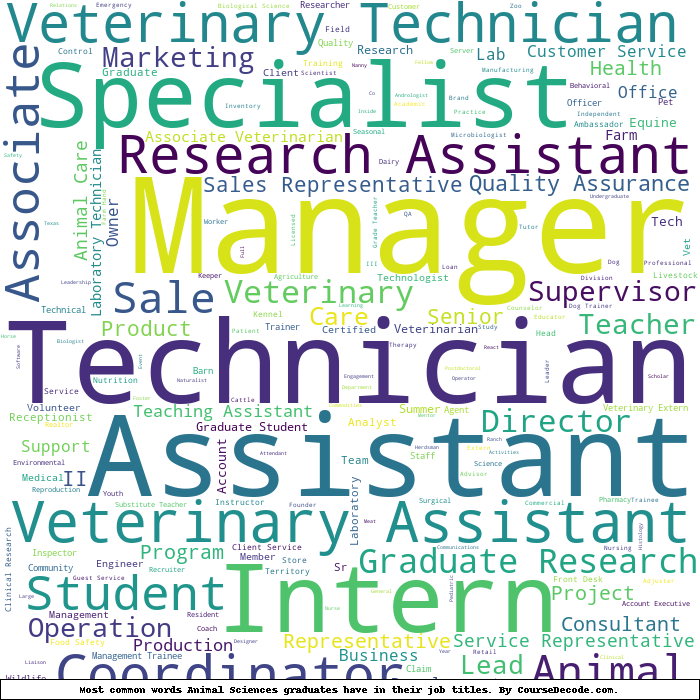
First, some facts. Of the Animal Sciences graduates from University of Wisconsin-River Falls we've analyzed , here's how many have used (or NOT used) their degree in their career:

These are estimates based on AI analysis of 10 LinkedIn profiles (see below).
The verdict? Below average. Overall, with an average relevance score of 58%, Animal Sciences graduates from University of Wisconsin-River Falls have a lower likelihood (-9%) of finding work in this field compared to the average graduate across all fields:
And for comparison, here's the chart for all profiles we've looked at across all degrees.
Also, after graduating, only 30% of these graduates have pursued further education other than another Bachelor's degree (such as a Masters degree or other), compared to the average across all profiles of 35%. This suggests a Bachelors degree is enough for most Animal Sciences graduates, and it's normal to look for work straight after graduation.
See the details:
|
Relevance score: 100% We think this person has gone into a career highly relevant to their degree. We think this person has gone into a career highly relevant to their degree.
DEGREE INFOGraduated in 2010 from University of Wisconsin-River Falls with a Bachelor's degree in Animal Sciences. No other secondary education since. JOB HISTORY SINCE GRADUATIONTerritory Manager/ Nutritionist R&D Life Sciences Mar 2012 - Present ABOUTNo information provided. |
The top 10 most common jobs done by the graduates we've analyzed (ranked most common to least) are:
Based on the LinkedIn profiles of graduates from the University of Wisconsin-River Falls who studied Animal Sciences, it’s clear that many of them have landed jobs directly related to their degree. Common roles include Animal Care Associates, Veterinary Technicians, and various positions in animal health and research, such as Laboratory Animal Attendants and Large Animal Research Technicians. These jobs often require hands-on knowledge and skills that align closely with the principles taught in their Animal Sciences courses, which shows a strong connection between their education and career paths.
However, not all positions held by these graduates remain within the sphere of Animal Sciences. There are quite a few examples of roles like Claims Representatives and Universal Bankers that are completely unrelated to the field. While some grads have branched out into roles where their animal science knowledge could be a benefit, many have taken paths that veer away from direct application of what they learned. Overall, it seems like a solid portion of alumni find relevant work in animal care and research fields, while others pursue careers that don't quite utilize their specialized training. So, while there’s a good number of related jobs, it’s equally evident that not every graduate is sticking to the animal sciences playbook.
Here is a visual representation of the most common words in job titles for Animal Sciences graduates (this is across all Animal Sciences graduates we've analyzed, not just those who went to University of Wisconsin-River Falls):

The graduates from the University of Wisconsin-River Falls with degrees in Animal Sciences seem to have a pretty diverse range of career paths right after graduation and several years down the line. Many of them kick off their careers in positions like animal care roles, laboratory technician jobs, or sales representative positions related to animal health. For instance, those graduating around 2011 often started in animal care or non-profit organizations, which indicates a genuine interest in animal welfare from the get-go. Others took on roles in companies focusing on animal health or research, showing a solid connection to their field of study.
As time goes on—let's say five to ten years after graduation—you see a mix of stability and some shifting in careers. While some have transitioned into higher-level positions within animal health and research, like territory managers or technical roles in preclinical services, others have ventured into unrelated areas, like business analytics or even teaching, which might suggest a bit of a detour from their original passions in animal sciences. Overall, it looks like a good number of graduates have managed to stay close to their field, building careers that align with their studies, even if a few have gone off on tangents. So if you’re into animals and considering a similar path, there are definitely options out there that keep you connected to your interests!
Getting a Bachelor’s degree in Animal Sciences at the University of Wisconsin-River Falls can be a solid mix of challenging and manageable, depending on your interests and strengths. If you love animals and are ready to dive into topics like animal biology, nutrition, and health, you might find it pretty engaging, which can make the workload feel lighter. That said, be prepared for some tough science classes and hands-on lab work, which can be pretty demanding. Overall, it’s not necessarily harder than the average degree, but it does require dedication and a real passion for the subject. If you’re into it, you’ll probably enjoy the journey, but you’ll definitely have to put in the effort!
Most commonly, in the LinkedIn profiles we've looked at, it takes people 4 years to finish a Bachelor degree in Animal Sciences.
Looking at these Animal Sciences graduates from the University of Wisconsin-River Falls, it seems they've had a pretty mixed bag when it comes to earning potential. Some of them landed solid career paths like Territory Manager or Business Analyst, which usually come with decent paychecks, while others started off with lower-paying roles in animal care or teaching. A few have also moved into more corporate or technical positions, which often pay better than traditional animal handling jobs. Overall, it looks like many are on a positive trajectory, but others are still working their way up. So, if you're considering a career in Animal Sciences, just keep in mind that while there are good opportunities out there, it might take some time to hit those higher salary brackets.
Here is a visual representation of the most common words seen in the "about" section of LinkedIn profiles who have a Bachelor degree in Animal Sciences (this is across all Animal Sciences graduates we've analyzed, not just those who went to University of Wisconsin-River Falls). This may or may not be useful:

Here are all colleges offering a Bachelor degree in Animal Sciences (ordered by the average relevance score of their Animal Sciences graduates, best to worst) where we have analyzed at least 10 of their graduates:
| College | Score | Count |
|---|---|---|
 Purdue University Purdue University
|
80 | 14 |
 California State Polytechnic University-Pomona California State Polytechnic University-Pomona
|
78 | 13 |
 North Carolina State University North Carolina State University
|
77 | 18 |
 Iowa State University Iowa State University
|
75 | 25 |
 University of Missouri-Columbia University of Missouri-Columbia
|
75 | 12 |
 South Dakota State University South Dakota State University
|
73 | 10 |
 The Ohio State University The Ohio State University
|
71 | 21 |
 University of Florida University of Florida
|
68 | 15 |
 University of Vermont University of Vermont
|
68 | 12 |
 Michigan State University Michigan State University
|
67 | 20 |
 University of California, Davis University of California, Davis
|
66 | 27 |
 University of Illinois at Urbana-Champaign University of Illinois at Urbana-Champaign
|
63 | 16 |
 University of Tennessee, Knoxville University of Tennessee, Knoxville
|
61 | 13 |
 University of Arkansas University of Arkansas
|
60 | 10 |
 California Polytechnic State University-San Luis Obispo California Polytechnic State University-San Luis Obispo
|
59 | 22 |
 University of Wisconsin-River Falls University of Wisconsin-River Falls
|
58 | 10 |
 Texas A&M University Texas A&M University
|
54 | 34 |
 Penn State University Penn State University
|
53 | 14 |
 Texas Tech University Texas Tech University
|
51 | 12 |
 Kansas State University Kansas State University
|
51 | 22 |
 Oklahoma State University Oklahoma State University
|
43 | 16 |